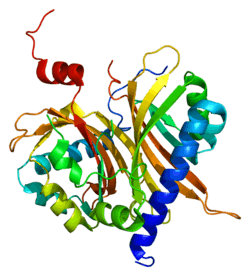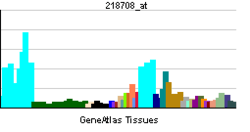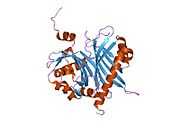NXT1
| Nuclear transport factor 2-like export factor 1 | |||||||||||||
|---|---|---|---|---|---|---|---|---|---|---|---|---|---|
 PDB rendering based on 1jkg. | |||||||||||||
| |||||||||||||
| Identifiers | |||||||||||||
| Symbols | NXT1 ; MTR2; P15 | ||||||||||||
| External IDs | OMIM: 605811 MGI: 1929619 HomoloGene: 8301 GeneCards: NXT1 Gene | ||||||||||||
| |||||||||||||
| RNA expression pattern | |||||||||||||
 | |||||||||||||
| More reference expression data | |||||||||||||
| Orthologs | |||||||||||||
| Species | Human | Mouse | |||||||||||
| Entrez | 29107 | 56488 | |||||||||||
| Ensembl | ENSG00000132661 | ENSMUSG00000036992 | |||||||||||
| UniProt | Q9UKK6 | Q9QZV9 | |||||||||||
| RefSeq (mRNA) | NM_013248 | NM_001110159 | |||||||||||
| RefSeq (protein) | NP_037380 | NP_001103629 | |||||||||||
| Location (UCSC) | Chr 20: 23.33 – 23.34 Mb | Chr 2: 148.67 – 148.68 Mb | |||||||||||
| PubMed search | |||||||||||||
NTF2-related export protein 1 is a protein that in humans is encoded by the NXT1 gene.[1][2][3]
The protein encoded by this gene is located in the nuclear envelope. It has protein similarity to nuclear transport factor 2. This protein functions as a nuclear export factor in both RAN (Ras-related nuclear protein)- and CRM1 (required for chromosome region maintenance)-dependent pathways. It is found to stimulate the export of U1 snRNA in RAN- and CRM1-dependent pathways and the export of tRNA and mRNA in a CRM1-independent pathway. The encoded protein heterodimerizes with Tap protein and may regulate the ability of Tap protein to mediate nuclear mRNA export. The use of alternate polyadenylation sites has been found for this gene.[3]
References
- ↑ Black BE, Levesque L, Holaska JM, Wood TC, Paschal BM (Jan 2000). "Identification of an NTF2-related factor that binds Ran-GTP and regulates nuclear protein export". Mol Cell Biol 19 (12): 8616–24. PMC 84993. PMID 10567585.
- ↑ Guzik BW, Levesque L, Prasad S, Bor YC, Black BE, Paschal BM, Rekosh D, Hammarskjold ML (Mar 2001). "NXT1 (p15) is a crucial cellular cofactor in TAP-dependent export of intron-containing RNA in mammalian cells". Mol Cell Biol 21 (7): 2545–54. doi:10.1128/MCB.21.7.2545-2554.2001. PMC 86886. PMID 11259602.
- ↑ 3.0 3.1 "Entrez Gene: NXT1 NTF2-like export factor 1".
Further reading
- Katahira J; Strässer K; Podtelejnikov A et al. (1999). "The Mex67p-mediated nuclear mRNA export pathway is conserved from yeast to human". EMBO J. 18 (9): 2593–609. doi:10.1093/emboj/18.9.2593. PMC 1171339. PMID 10228171.
- Ossareh-Nazari B; Maison C; Black BE et al. (2000). "RanGTP-binding protein NXT1 facilitates nuclear export of different classes of RNA in vitro". Mol. Cell. Biol. 20 (13): 4562–71. doi:10.1128/MCB.20.13.4562-4571.2000. PMC 85847. PMID 10848583.
- Herold A; Suyama M; Rodrigues JP et al. (2000). "TAP (NXF1) belongs to a multigene family of putative RNA export factors with a conserved modular architecture". Mol. Cell. Biol. 20 (23): 8996–9008. doi:10.1128/MCB.20.23.8996-9008.2000. PMC 86553. PMID 11073998.
- Black BE; Holaska JM; Lévesque L et al. (2001). "NXT1 is necessary for the terminal step of Crm1-mediated nuclear export". J. Cell Biol. 152 (1): 141–55. doi:10.1083/jcb.152.1.141. PMC 2193657. PMID 11149927.
- Jun L; Frints S; Duhamel H et al. (2002). "NXF5, a novel member of the nuclear RNA export factor family, is lost in a male patient with a syndromic form of mental retardation". Curr. Biol. 11 (18): 1381–91. doi:10.1016/S0960-9822(01)00419-5. PMID 11566096.
- Fribourg S, Braun IC, Izaurralde E, Conti E (2001). "Structural basis for the recognition of a nucleoporin FG repeat by the NTF2-like domain of the TAP/p15 mRNA nuclear export factor". Mol. Cell 8 (3): 645–56. doi:10.1016/S1097-2765(01)00348-3. PMID 11583626.
- Wiegand HL; Coburn GA; Zeng Y et al. (2002). "Formation of Tap/NXT1 heterodimers activates Tap-dependent nuclear mRNA export by enhancing recruitment to nuclear pore complexes". Mol. Cell. Biol. 22 (1): 245–56. doi:10.1128/MCB.22.1.245-256.2002. PMC 134221. PMID 11739738.
- Katahira J; Straesser K; Saiwaki T et al. (2002). "Complex formation between Tap and p15 affects binding to FG-repeat nucleoporins and nucleocytoplasmic shuttling". J. Biol. Chem. 277 (11): 9242–6. doi:10.1074/jbc.M110007200. PMID 11756420.
- Deloukas P; Matthews LH; Ashurst J et al. (2002). "The DNA sequence and comparative analysis of human chromosome 20". Nature 414 (6866): 865–71. doi:10.1038/414865a. PMID 11780052.
- Strausberg RL; Feingold EA; Grouse LH et al. (2003). "Generation and initial analysis of more than 15,000 full-length human and mouse cDNA sequences". Proc. Natl. Acad. Sci. U.S.A. 99 (26): 16899–903. doi:10.1073/pnas.242603899. PMC 139241. PMID 12477932.
- Gerhard DS; Wagner L; Feingold EA et al. (2004). "The status, quality, and expansion of the NIH full-length cDNA project: the Mammalian Gene Collection (MGC)". Genome Res. 14 (10B): 2121–7. doi:10.1101/gr.2596504. PMC 528928. PMID 15489334.
- Rual JF; Venkatesan K; Hao T et al. (2005). "Towards a proteome-scale map of the human protein-protein interaction network". Nature 437 (7062): 1173–8. doi:10.1038/nature04209. PMID 16189514.
| |||||||||||

